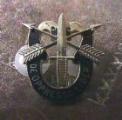Slightly adapted from a post by M-A Lagrange, after a Santa Claus discussion:When you try to build a state from scratch, like in Afghanistan or Sudan (different setting, context, history... all agreed in advance), is dictatorship a necessary path or just the wall we all end up hitting?
The point was that despite using the democratic tool box, what ever the example you look at closely, you always end in a fake state (most of the time with a military like dictatorship or, at the best, a kleptocracy).












Bookmarks